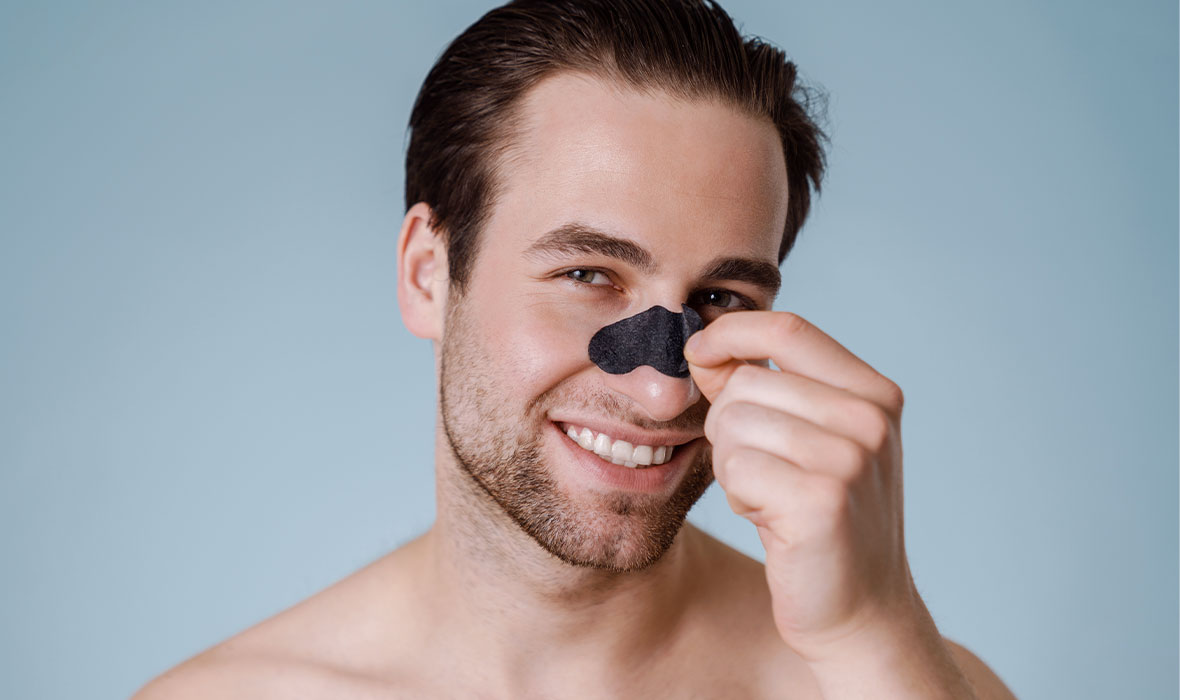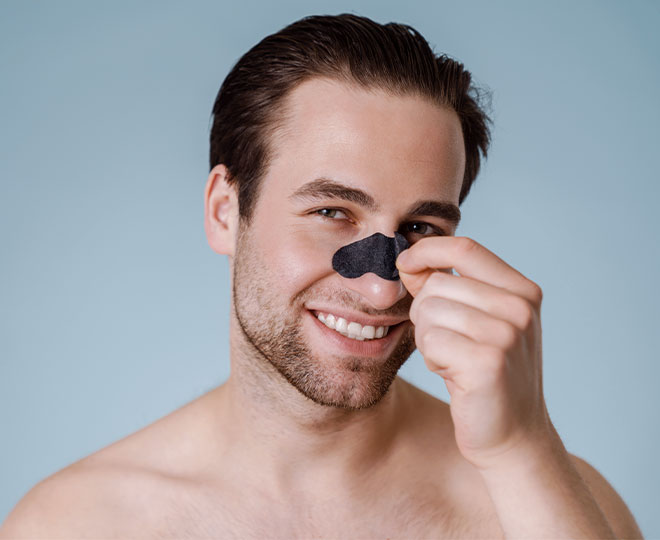When you look in the mirror and see tiny dark spots on your skin, you may be wondering, "Is that dirt or are these blackheads?". Once you realize your skin is actually clean, you may start to ask yourself even more questions… "What causes blackheads? Is this a hormone thing? Or something I can prevent? Am I weird, or does everyone get blackheads?".
For starters: You’re not weird, we promise! Blackheads are super common. According to the American Academy of Dermatology Association, about 85% of people between ages 12 to 24 experience pimples due to blocked pores, a primary cause of blackheads.
In learning how to prevent blackheads, it’s important to understand what blackheads are, what causes blackheads, and the difference between blackheads and whiteheads. The good news? We’ve got answers to all those questions — and more.
What exactly, are blackheads?
Along with whiteheads, papules, and pustules, blackheads are among the most common types of acne.
Blackheads occur when open pores become plugged with your skin’s natural oil (sebum) and dead skin cells. Your sebum actually contains melanin (skin’s natural pigment) which turns black when it reacts to oxygen, a process known as oxidation.
Blackheads can appear anywhere on your face and body where there are hair follicles (aka pores), which includes your face, neck, chest, back, arms, and shoulders. That said, you’ll usually find blackheads in your t-zone — a section of your face (in the shape of a T) that includes your forehead, nose, and chin. Why the t-zone? Because this zone has a larger density of hair follicles with attached oil glands. And yes, men and women can have hair follicles on their chin!
What causes blackheads?
There are millions of pores, also called hair follicles, on your body, including your face. Each contains a hair and a sebaceous gland that produces oil to help keep your skin moisturized, soft and protected. When your skin naturally regenerates and sheds dead skin cells, those dead cells can get into the follicle. When they mix with the oil and debris already in your pores, they form a plug that pushes to the surface and forms a tiny bump, called a comedone. Blackheads are a type of comedone.
What can cause more blackheads than normal is excess oil production. Having oily skin is often genetic, but it can also be a result of hormones, and hormonal changes in the body. Hormone surges can happen for many reasons, at all ages, but are especially common during puberty, which explains why so many teenagers tend to get blackheads, whiteheads, and pimples.
Blackheads vs. whiteheads
Unlike blackheads (aka open comedones) that occur when the clogged pore is exposed to the air and the melanin oxidizes, whiteheads occur when the clogged pore remains closed with a thin layer of skin over it, so the mixture doesn’t have a chance to oxidize and stays white.
Whiteheads are known as closed comedones. Similarly to blackheads, whiteheads also occur when the follicles beneath the skin fill with oil and dead skin cells, but with whiteheads, air isn’t able to enter the follicle to oxidize it so the bacteria inside doesn’t undergo a chemical reaction and stays white.
Though blackheads and whiteheads look a bit different, they form in the same way and are both types of clogged pores, so their treatment is similar.
Should you squeeze blackheads to remove them?
As tempting as it may be to get those suckers loose, don’t ever do it. Blackheads should never be removed by squeezing, picking, or popping at home — doing so will cause inflammation and potential scarring, making matters worse. Plus, this can encourage the spread of bacteria from rest of your skin, which can turn your blackhead into an inflamed pimple and, worse, lead to more acne in other places. And this doesn’t just apply to blackheads! Picking at pimples of any kind can lead to discoloration, scarring, or red, irritated, and painful skin. And no one wants that, right?
Before we reveal exactly how to prevent blackheads, it’s worth debunking a few myths about blackheads so you know what to do — and what not to do! — in preventing blackheads.
Does the sun help clear blackheads?
Sadly, no. There’s a myth that spending time in the sun can dry up or clear up your acne, but there’s no scientific proof of this. This myth may have arisen because getting a bit of sun can temporarily dry up your complexion. But, over time, the sun’s rays can leave your skin dry, irritated, and inflamed, leading to an overproduction of oil to compensate for this dryness – and yes, more pimples. As fun as it is to bask in the sun, overexposure without proper protection can also lead to premature skin aging and even cancer. You can still enjoy the sun, but make sure to use a noncomedogenic sunscreen that’s at least SPF 30 before heading outdoors. Hats help too!
Does makeup cause blackheads?
Makeup doesn’t directly cause blackheads, but it can be a contributing factor if the makeup you’re using is oil based or not properly removed. So, make sure to thoroughly remove your makeup each night, and choose noncomedogenic products that won’t clog your pores or irritate your skin. Another helpful tip if you’re an avid makeup user? Regularly clean and replace your makeup brushes to avoid bacteria buildup on the brush that can contribute to acne on your skin.
Some brands have begun including acne-fighting ingredients like benzoyl peroxide or salicylic acid in their foundation formulas, so those can be a great option for those who want to cover up and fight breakouts.
Tips for how to prevent blackheads
Here are a few easy ways to help prevent blackheads.
- Keep your face clean by washing it twice a day, morning and night, with an acne-fighting face wash like the Proactiv Solution Renewing Cleanser or Proactiv+ Skin Smoothing Exfoliator
- Avoid touching your face as much as possible
- Resist extracting blackheads or popping pimples of any kind
- Use water-based gels and sprays for your hair and keep your hair off your face if possible
- Change your pillowcase often — they can be a breeding ground for dead skin cells, oil from your skin and hair, and bacteria, all of which can reenter your pores and cause blackheads, whiteheads, and inflamed pimples
- Choose oil-free makeups that won’t clog your pores and always (always!) remove your makeup before bed
- Avoid too much sun exposure as it can cause inflammation and dry out your skin, which can lead your body to overcompensate with an overproduction of oil
- Look for products that contain benzoyl peroxide or salicylic acid — both help prevent acne and remove excess oil and dead skin cells that are clogging your pores
- Maintain a consistent skincare routine morning and night — cleanse, treat, and moisturize (and don’t forget a layer of SPF in the morning!)
Products that help prevent blackheads
Ready to say goodbye to blackheads and get consistently clear skin?
Proactiv skincare systems are formulated to help treat and prevent blackheads. Plus, Proactiv’s Blackhead Dissolving Gel is a quick, 5 minute mask that’s formulated with salicylic acid to dissolve blackheads, unclog pores, absorb excess oil, and deep-clean your skin from any blemish-causing impurities. It’s also designed to soothe irritated skin and shrink the appearance of pores for a healthy, glowing complexion.
Even when your hormones are raging and you may have lost hope, the good news is blackheads CAN be treated and prevented. With proper hygiene and the right skincare, you’ll have clear skin in no time.






